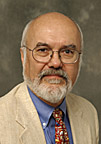April 14, 2006
Parker honored for core curriculum teaching
CARBONDALE, Ill. -- Microbiologist Jack M. Parker, dean of the College of Science since 1993, has won top honors for faculty members teaching in SIUC's core curriculum — a set of broadly based foundation courses that impart skills and knowledge all students need to become educated citizens in a global society.
Parker will receive $2,000 through SIUC's "Excellence Through Commitment Awards Program," set up by Chancellor Walter V. Wendler to reward ongoing contributions by tenured and term faculty, staff and graduate assistants throughout the University. The program reflects SIUC's aim of encouraging outstanding work, one of the goals of Southern at 150: Building Excellence Through Commitment, the blueprint for the development of the University by the time it celebrates its 150th anniversary in 2019.
Wendler will host a dinner to honor all award recipients April 27.
Parker, who has no required teaching assignment, teaches the core course in human genetics and human health, a course he designed from scratch for students with no background in science. Along with a teaching partner, he has taught this course, which focuses on the principles and complexities of human genetics, both fall and spring semesters since autumn of 1996.
The course provides basic background information and an overview of the latest changes in genetic testing, forensic genetics, biotechnology and treatments for genetic diseases.
Parker aims to show students in broad terms how genetics affect human health and how lifestyle choices can interact with genetic material. He also wants them to learn how to understand and evaluate information they may get in the future from a family doctor or genetics counselor, how to find information on genetic disorders and services, and how to assess the risks and benefits of such technology as genetic testing and gene therapy.
"Human genetics is an ideal subject in which to relate the subject matter directly to the students, their families and society," Parker wrote in a statement summarizing his teaching philosophy.
"It is an extremely fast-moving field, and many newspapers and newsmagazines have articles almost every week on some aspect of human genetics and its societal implications. This makes it easier to convince students this is something they need to know how to think about."
Parker helps them think about the subject with one weekly lecture and one weekly discussion group, with no more than 20 students in each group.
"This gives students an opportunity and actual requirement to directly interact with their faculty instructor, a dean, on a weekly basis!" wrote microbiology Chair John M. Martinko in a letter nominating Parker for the award — an opportunity that one student, commenting in an end-of-term evaluation, apparently found quite amazing.
"Dr. Parker was very down to earth for being higher up," the student wrote.
Much of the course has an Internet component. While this gives those students who lack computer-related skills a chance to gain them, it has another advantage for them all.
"Even those students with considerable technical skills have not usually acquired the critical thinking skills to differentiate valuable and relevant material from that which is less than adequate or even misleading," Martinko wrote.
"After they develop the tools to independently gather and select resources, Jack and the other instructor, through the discussion sections, guide the students to identify the useful, relevant, and credible information mixed with the sometimes overwhelming amount of available material."
Parker's colleagues describe him as "personal and approachable," "enthusiastic, engaging, stimulating," "gifted." His students concur.
Lindsay J. Mondino, now a senior in microbiology, took the course last year. In a letter supporting his candidacy for the award, she wrote, "Dr. Parker, with his wry humor and enthusiasm for the subject, made human health and genetics come to life. He deftly sprinkled the information with real-life examples, which made the material more relevant to his students. His own personal experiences with genetic disorders were also shared, making him seem more genuine and, well, human, which for most professors is singularly remarkable."
And, she noted, he had the human touch.
"It never fails to amaze me that he still remembers me over a year later and takes the time to stop and say hello," she wrote.
Parker came to SIUC in 1977 with dual appointments in the College of Science and the School of Medicine. A native of Geneseo, he grew up near Kewanee and earned his bachelor's degree in 1967 from North Central College in Naperville. He earned his doctorate in 1973 from Purdue University in West Lafayette, Ind.

Jack M. Parker
Download Photo Here
